“God knows I would rather be cold and hungry than that the poor should be deprived of any consolation in our power to afford.” – Venerable Catherine McAuley
Strabane Mercy Centre is situated in downtown Johannesburg. When we celebrated our centenary in 1998, Johannesburg was a far cry from being the major tourist attraction in South Africa. The city centre had become quite derelict, businesses moved out to the suburbs and soon, because of crime and other factors, it became a no-go area. Scores of people who had come to Johannesburg (also named Egoli – City of Gold) to seek employment soon found their dreams shattered. Most of these ended up on the streets of Johannesburg, unemployed and homeless, and with no means of supporting themselves. After much discernment by the Sisters of Mercy, it was decided that the greatest need at that time was a place of safety for the many homeless people, and so Strabane Mercy Centre for the Homeless was set up as part of our centenary project.
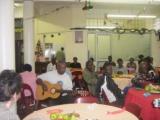
I was overjoyed when I was appointed Co-Ordinator of the project. Since then I have witnessed so much sadness and pain, but there were also some beautiful moments as when residents were reunited with their families, or got permanent jobs as a result of the skills training at the Centre.
The Centre caters for a hundred homeless people every night. These people are from every walk of life, many of whom have known better times. The main objective is to improve the quality of life of the many homeless people who often live in appalling conditions but, even worse, have lost all hope. When they first enter the Shelter, many of them are suffering from depression, stress and other forms of brokenness. Each has his/her own story to tell, stories that wrench the heart. Thanks to the dedicated and caring staff, which has been formed in our Mercy Charism, the new residents are greeted with loving care. The availability of a hot shower, fresh clothes and a safe place in which to rest often marks the beginning of a renewed sense of their own worth.
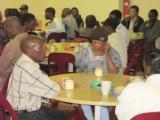
As Catherine says, “There are things the poor prize more highly than gold, though they cost the donor nothing. Among these are the kind word, the gentle compassionate look and the patient hearing of sorrows.” As time goes on, they begin to regain a sense of their dignity and self-esteem and find hope for the future. For me, this is most rewarding, and I thank God for Catherine’s legacy – her passion for the poor and deprived.
In addition to providing a hundred indigent people with food and shelter, the Centre also provides social services. There is an Advice Bureau to assist both residents and non-residents. Help is provided to enable people to get jobs, to apply for disability pensions, child allowances, I.D. documents and housing. The residents are also encouraged to make contact with their families and they are assisted to do so. We further provide skills training in marketable skills such as computer literacy, sewing, fabric painting and car guarding. We also network with other organisations in the city which provide training courses such as welding, bricklaying and soft toy making. We arrange for some of our residents to attend these courses and provide them with the means to do so in the hope that, once they become employable, they will be reintegrated into society.
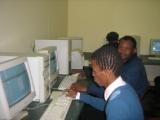
One of our touching stories concerns Obed, a middle-aged Zimbabwean national. He came to our Shelter one afternoon weak, dirty and very neglected. He had lost his job and had spent two weeks sleeping in the park. Immediately, our devoted staff supplied him with soap, toothpaste, shampoo, towels etc. After a hot bath and a change of clothes he shared his story. He was HIV positive and had nowhere to go. Because of his HIV status he could not return home even if he had the means. The following day we brought him to St. Francis Hospice where the doctors predicted that he might last a week. Sr. Rachel, a Sister of Mercy who works at the Centre, took very special care of Obed. To the surprise of all, and after prolonged treatment, he recovered. Today he holds a permanent job as a chef in one of the restaurants in a neighbouring town. He visits Strabane Centre occasionally for a cup of tea and, when he cannot visit, communicates by phone. He claims Strabane Centre gave him back his life.
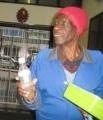
Allen, quite a character, sat outside the Centre begging for weeks on end. Our ever vigilant staff observed him and got to know that he was homeless, as well as being a hopeless drunkard. We invited him in and supplied him with toiletries for a shower. He rebelled. Two members of the Staff eventually scrubbed him up amid shouts and protests. He then shared his story.
He had been an alcoholic for twenty years and lived on the streets. His problem was triggered by the violent death of his brother who was murdered by his wife. He lost contact with the rest of his family, and spent his lonely days on the streets begging from the passers-by. We managed to trace his sister who had not seen him for twenty years and thought that he was dead. The reunion was very touching, and the contact continues. One day, Allen was carried into the Centre as he was unable to walk. He was taken to hospital. The doctors said the alcohol had affected his brain and nothing could be done. We were very grateful to get him into Mother Teresa’s Hospice. He attends daily Mass, gets no more alcohol and is very happy. We still visit him regularly.
Many women pass through the Centre as a result of broken marriages, unemployment, and rejection by their families because of their HIV status. They are more to be pitied in some ways as they find themselves homeless, friendless and scared on the streets of a big city.
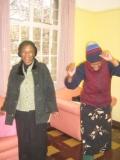
This is one woman’s story.
“My husband walked away from me for no apparent reason, leaving me with two young children to take care of. I lost my job when the factory where I was employed closed down. With no one to turn to, I trudged the city streets looking for a job and a place to stay. One day, another homeless lady told me about Strabane Centre. When I arrived, I was greeted with the usual friendliness, given all the necessary toiletries, clothes and a comfortable bed. I began collecting tins to make some money. Today, I have a housekeeping job in a nearby suburb and can now afford accommodation for myself and my two children”
Some Testimonies from the Shelter.
“This place is neat and clean. We give a donation if we have it, which is nothing compared to all they do for us here. We get breakfast and supper for free, watch TV, shower and sleep in free bedding. On top of that they have taught us to live like brothers and sisters and that is the nicest part of staying here. I sell cardboard for recycling and so I can give my donation.”
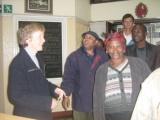
Another gentleman called Temba, who has now moved out of the Shelter, had this to say: “I didn’t plan to spend all my life here and I don’t want to depend on Shelters for survival. I only came here because I was unemployed but, thanks to Strabane Centre, I am what I am to-day.”
A lady who is now working as a cashier in Pick and Pay says: “I came here with nothing, but I am leaving here with dignity, sewing skills and basic computer skills which got me my job. Thank you Strabane and thank you God.”
To illustrate the fear that can accompany those who find themselves without a home, I recall the story told by Nelson Mandela in his book ‘The Long Road to Freedom’. Mandela relates how, during the long years of his imprisonment on Robben Island, he had a recurring nightmare. He says: “In the dream, I had just been released from prison – only it was not Robben Island but a jail in Johannesburg. I walked outside the gates into the city and found no one to meet me. In fact, there was no one there at all, no people, no cars and no taxis. I would then set out on foot towards Soweto. I walked for many hours before arriving in Orlando West, and then turned the corner towards No. 8115. Finally, I would see my home, but it turned out to be empty, a ghost house, with all the doors and windows open but no one there at all.”
To have a home is not just to have a house, a shelter. It is to have a relationship with people who accept us for who we are, and who give us a feeling of respect and belonging.
Kieran McGettrick rsm
South African Province


